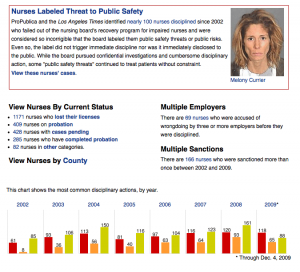
Get rich in the temp nursing business
On Sunday, my ProPublica colleagues Tracy Weber and Charles Ornstein, in conjunction with the Los Angeles Times, put out a story examining the lack of standards in the temp nursing agency, a dangerous situation considering California’s desperate shortage of nursing staff.
Emboldened by a chronic nursing shortage and scant regulation, the firms vie for their share of a free-wheeling, $4-billion industry. Some have become havens for nurses who hopscotch from place to place to avoid the consequences of their misconduct. (see related story: A ‘Crazy’ Way for an Industry to Operate)
A joint investigation with the Los Angeles Times found dozens of instances in which staffing agencies skimped on background checks or ignored warnings from hospitals about sub-par nurses on their payrolls. Some hired nurses sight unseen, without even conducting an interview.
The gist of the problem: California lacks virtually any kind of tracking of errant temp nurses. This nurse, for example, was accused of stealing drugs from at least six hospitals, suffered a drug-induced seizure on the job, and had his Minnesota nursing license suspended before California got around to filing an accusation against him. Two years later, after a few more reported incidents of drug theft, the California registered nursing board finally revoked his license when he didn’t make his hearing on time.
Charlie and Tracy have been covering this story even before they joined ProPublica; LATimers Maloy Moore and Doug Smith contributed a massive amount of the essential research and data-analysis. This temp nurses chapter is just another consequence of what appears to be awful records-keeping and sloth by the various oversight bodies.
My own contribution to the coverage was small, the most notable aspect of which was this Ruby on Rails site I built to catalogue the sanctioned nurses, a relatively minor task compared to actually collecting and parsing the data (i.e. reading through all the PDF files for the buried information). . It was pretty simple, allowing users at a glance to see the numbers of disciplined nurses by various categories, including year and type of discipline. I was a little skeptical of doing it at first, just because the CA nursing board does have a searchable and functional database of its own.
Theoretically (well, if it weren’t the case that the records themselves are often incomplete, so that criminal nurses come up with a clean sheet), any member of the public could look up their own nurses’ records and avoid the bad ones. But the meat of the Charlie’s and Tracy’s is the numbers: 1,254 days on average to discipline a nurse (compared to 173 for Texas). 1,706 days before one nurse, who was kicked out of a drug-recovery program and considered a threat to public safety, had even an accusation filed against her. Our site makes it evident that hard numbers, not just heartbreaking anecdotes, argue against California’s regulatory status quo.
The reporters on this story put in months of time manually tabulating the data to come up with the thrust of their stories. Sadly, all of these numbers and statistical conclusions were probably right under the nursing board’s nose. The regulators apparently track dates and types of accusations and disciplines for each nurse. A few simple database queries would’ve quickly uncovered the glaring delays and bottlenecks in the system (e.g. (SELECT AVG(TO_DAYS(`date_discipline`)-TO_DAYS(`date_initial_complaint`)) as average_delay from `disciplinary_actions`).
A day after Charlie and Tracy’s initial story in July 2009, Gov. Schwarzenegger sacked a majority of the registered nursing board and new regulations include making public the restrictions on a nurse’s license. Read ProPublica’s complete coverage on California’s flawed oversight of health-care workers here.
